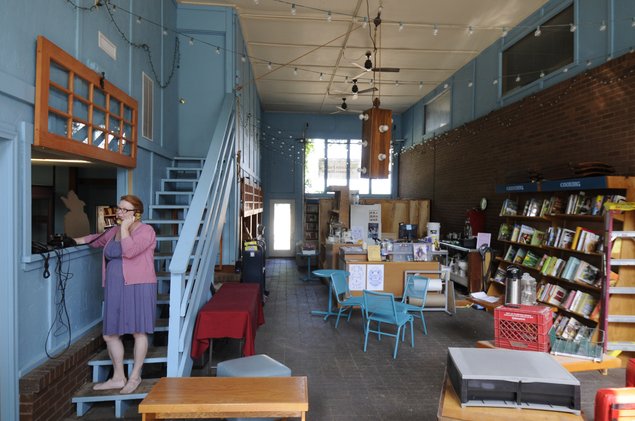Bookshops' varying lures speak volumes

FAYETTEVILLE -- Though only 220 steps separate Dickson Street Bookshop from Nightbird Books in downtown Fayetteville, the bookstores' strategies for succeeding in a tricky market could not be further apart.
Dickson Street Bookshop is old school. To walk into the store is to experience organized chaos. Because there's no inventory, it's impossible to know how many used books comprise the 36-year-old business. Manager Suedee Hall Elkins says there might be 100,000 books on the shelves, plus many times that number in storage.
"I couldn't even guess how many," she said with a laugh. "A million, maybe." It's hard to tell just how serious she is.
Behind the counter sits an African mask that a man short on money traded for books. Soul music plays. The smell of old paper and children's books near the front door draw people in.
"It seems that Otis Redding sells a lot of books," Elkins said.
The store appeals to those who want to browse. Books on Baptists, biology, South America and nuclear war can be found within 10 feet of one another.
"It's a dying breed, you know," she said. "There's really nothing like this anywhere close to here, especially this size."
Nightbird Books has a different vibe. Instead of decades-old paper, Nightbird smells of new books and coffee. There are tables and nooks where people can sit and enjoy the 8,000 to 10,000 books. The store offers author readings, summer camps, book clubs and farmers markets.
Owner Lisa Sharp said she wants to keep the focus on the books, but has to engage the community in other ways to stay in business.
"A lot of people come to the bookstore, want to support the bookstore, but they don't need another book right now," she said. "This is my livelihood and it's something I truly, truly enjoy. If it's hard for me to read as much as I used to, it's gotta be hard for a lot of people."
That's where the events come in.
She sells coffee, beer and wine. That way when people go to a book club with an Amazon e-reader, she can still make a few dollars off a drink. Even so, she said it's a break-even business during a good month, at least until Christmas rolls around.
"We've learned to be careful about what we eat and where we shop even -- people are eating and shopping locally -- but I think that we're starting to not be really aware of how we spend our time," Sharp said. "We're not choosing how to spend our time, it's just a whatever's easy kind of thing."
Are Nightbird and Dickson Street Bookshop in competition? The businesses agree they aren't each other's enemy.
"It's just hard when you have Amazon and online. People can stay at home and order something for a penny online; it's hard to compete with that, unless you have people who really love to come in and search and treasure hunt," Elkins said. "The more bookstores in town, the better for us, because if people are buying books, they'll be able to sell them back here."
Among old cartoons, a Nightbird bookmark hangs in Dickson Street Bookshop. And a tenth of a mile down the street, Sharp echoes that sentiment.
"It's nice that we're so close because people will check both of us before driving up to Barnes & Noble. We refer people to each other all the time," she said. "But it's really more that people are spending more time on social media and playing Candy Crush that we're not so much competing with other booksellers as we're competing for people's time."
Dan Cullen, senior strategy officer at the American Booksellers Association, which represents independent bookstores, said whatever their strategy, small booksellers have to be responsive to local customers.
"Indie booksellers are committed to constant reinvention," he said. "The successful ones see themselves as always a work in progress."
Cullen said the association has members in more than 2,000 locations -- the most since 2005. Small booksellers are in a tough market, but the growth of the local-first movement and the prevalence of social media have allowed local stores to communicate with customers in new ways.
"The trend is clear. The fact that our members are locally owned and engaged in their communities is important to their customers," he said. "People want to find a place in their community that isn't work and isn't home. They want to be able to reconnect with people, but also themselves."
At Dickson Street Bookshop, customers find themselves alone -- or with friends -- pleasantly lost in a mountain of books. At Nightbird, customers look through new releases or attend an event while sipping coffee. Whatever the strategy, the booksellers have to sell an experience -- instead of just books -- to keep the lights on.
"There isn't a computer algorithm that's going to replicate that and customers enjoy that," Cullen said. "As more of us spend more time in front of a screen, I think we want to be able to balance that experience with an in-person, vivid, technicolor experience."